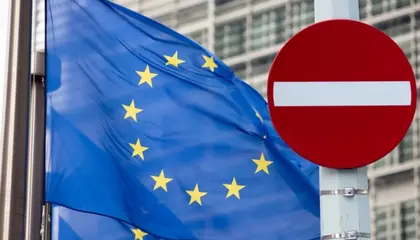The European Union on Friday, Dec 16, imposed a fresh round of sanctions on Moscow, including restricting the export of drone engines to Russia or countries like Iran looking to supply Moscow weapons.
The measure was part of the ninth wave of sanctions slapped on Russia by the EU since the start of the full-scale invasion of Ukraine in February.
JOIN US ON TELEGRAM
Follow our coverage of the war on the @Kyivpost_official.
The new package was intended to further crimp Moscow's ability to wage war on its neighbor.
But more hawkish eastern EU members complained it was a "missed opportunity" after coastal states such as Belgium and Netherlands demanded exemptions from earlier sanctions on fertilizer producers.
These EU members argued the easing was needed to smooth the export of agricultural products to the rest of the world and reduce the risk of famine -- an argument rejected by Poland and Lithuania.
The dispute held up the approval of the sanctions until a summit by EU leaders on Thursday.
The new measures included adding almost 200 individuals and entities to an asset freeze and visa ban blacklist.
"This includes the Russian armed forces, as well as individual officers and defence industrial companies, members of the State Duma and Federation Council, ministers, Russian proxy authorities in occupied areas of Ukraine and political parties, among others," the EU said.
Three banks were targeted, including the Russian Regional Development Bank to "further paralyze Putin's cash machines".

EU Transfers €1.5 Bln Raised From Russian Assets for Ukraine
Four more Russian television chains were also barred from broadcasting in the bloc.
In terms of broader economic sanctions, new EU investments in the Russian mining sector were banned, except for "certain raw materials".
The export of more "dual-use" goods that could serve Moscow's war effort were also prohibited, and EU firms prevented from offering services such as market research and advertising.
The new sanctions were imposed as Moscow carried out another wave of strikes targeting Ukraine civilian energy infrastructure.
The EU has already imposed eight rounds of unprecedented sanctions on Russia since it launched its invasion, including targeting its key oil exports.
But diplomats have warned that the bloc is increasingly running out of ways to hurt the Russian economy as the war drags on towards its 10th month.
The bloc has shied away from targeting gas supplies from Russia for fear of further pushing up energy prices. It has also steered clear of sectors important to individual member states, such as diamonds.
The EU, along with its partners in the G7, introduced measures last week aimed at capping the price of Russian oil sold on the world market, in a bid to limit funds for Moscow's war machine.
The EU's ban on seaborne crude imports from Russia also came into force, after initially being agreed early this year.
You can also highlight the text and press Ctrl + Enter






